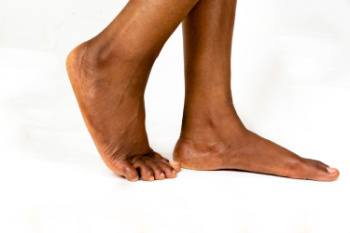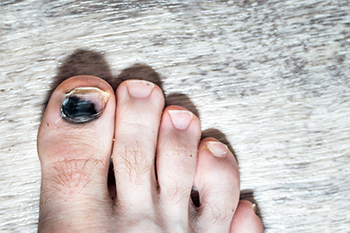Items filtered by date: May 2024
Identification and Diagnosis of Flat Feet

Flat feet, or fallen arches, are a common condition where the arches on the inside of the feet are flattened, allowing the entire sole to touch the floor while standing. This can be identified through a simple test. Wet your feet and stand on a flat surface where your footprint will show. A complete imprint of the sole indicates flat feet. Causes range from inherited genetic traits to weakened muscles in the feet and ankles due to aging or injury. While flat feet themselves are not always problematic, they can lead to complications such as foot pain, alignment issues with the ankles and knees, and increased risk of injuries. Management options include wearing supportive shoes, custom orthotic devices, engaging in exercises that strengthen foot muscles, and reducing activities that put excessive strain on the feet. If you have flat feet and have foot pain or mobility issues that persist, it is suggested that you see a podiatrist for a thorough evaluation and tailored treatment plan.
Flatfoot is a condition many people suffer from. If you have flat feet, contact one of our podiatrists from Florida Ankle & Foot Institute. Our doctors will treat your foot and ankle needs.
What Are Flat Feet?
Flatfoot is a condition in which the arch of the foot is depressed and the sole of the foot is almost completely in contact with the ground. About 20-30% of the population generally has flat feet because their arches never formed during growth.
Conditions & Problems:
Having flat feet makes it difficult to run or walk because of the stress placed on the ankles.
Alignment – The general alignment of your legs can be disrupted, because the ankles move inward which can cause major discomfort.
Knees – If you have complications with your knees, flat feet can be a contributor to arthritis in that area.
Symptoms
- Pain around the heel or arch area
- Trouble standing on the tip toe
- Swelling around the inside of the ankle
- Flat look to one or both feet
- Having your shoes feel uneven when worn
Treatment
If you are experiencing pain and stress on the foot you may weaken the posterior tibial tendon, which runs around the inside of the ankle.
If you have any questions please feel free to contact our offices located in Tavernier, Marathon, and Key West, FL . We offer the newest diagnostic and treatment technologies for all your foot and ankle needs.
See Your Foot Specialist Regularly If You Work On Your Feet
Painful Runner's Toe

Runner’s toe, also known as black toenail or jogger's toe, is a common condition among runners and athletes. It occurs when the toes repeatedly hit the front of the shoe, causing trauma to the toenail bed. This trauma can lead to bleeding under the nail, resulting in discoloration that looks black or purple and sometimes pain. The main cause of runner’s toe is the repetitive pressure and impact experienced during running or other high-impact activities. Additionally, poorly fitting shoes or shoes that are too tight can increase pressure on the toes. The condition is more prevalent in long-distance runners or those who frequently engage in activities that involve repetitive toe movement. While runner’s toe is typically not a serious medical concern, it can be uncomfortable and may require treatment if pain or infection develops. Proper footwear can help prevent this condition, allowing runners to enjoy their sport without the discomfort of black toenails. If you have toe pain, it is suggested that you contact a podiatrist who can diagnose and treat runner’s toe.
Toe pain can disrupt your daily activities. If you have any concerns, contact one of our podiatrists of Florida Ankle & Foot Institute. Our doctors can provide the care you need to keep you pain-free and on your feet.
What Causes Toe Pain?
Most severe toe pain is caused due to a sports injury, trauma from dropping something heavy on the toe, or bumping into something rigid. Other problems can develop over time for various reasons.
Toe pain can be caused by one or more ailments. The most common include:
- Trauma
- Sports injury
- Wearing shoes that are too tight
- Arthritis
- Gout
- Corns and calluses
- Hammertoe
- Bunions
- Blisters
- Ingrown toenails
- Sprains
- Fractures (broken bones)
- Dislocations
When to See a Podiatrist
- Severe pain
- Persistent pain that lasts more than a week
- Signs of infection
- Continued swelling
- Pain that prevents walking
Diagnosis
In many cases the cause of toe pain is obvious, but in others, a podiatrist may want to use more advanced methods to determine the problem. These can range from simple visual inspections and sensation tests to X-rays and MRI scans. Prior medical history, family medical history, and any recent physical traumatic events will all be taken into consideration for a proper diagnosis.
Treatment
Treatments for toe pain and injuries vary and may include shoe inserts, padding, taping, medicines, injections, and in some cases, surgery. If you believe that you have broken a toe, please see a podiatrist as soon as possible.
If you have any questions please feel free to contact our offices located in Tavernier, Marathon, and Key West, FL . We offer the newest diagnostic tools and technology to treat your foot and ankle needs.
The Impact of High Heels on Foot Biomechanics

Wearing high heels can significantly alter the biomechanics of the feet, leading to various effects that extend beyond fashion considerations. The elevation of the heel shifts the body's weight forward, causing increased pressure on the balls of the feet and toes. This can result in discomfort, pain, and even the development of conditions like bunions, hammertoes, and neuromas over time. The arch of the foot is also affected, as high heels can cause it to become overly extended or flattened, potentially contributing to issues such as plantar fasciitis or Achilles tendonitis. Additionally, high heels can affect balance and stability, increasing the risk of ankle sprains or falls. Prolonged wear of high heels may lead to muscular imbalances and changes in gait patterns, further exacerbating foot problems. If you have foot pain and feel it may be coming from frequently wearing high heels, it is suggested that you schedule an appointment with a podiatrist who can offer you relief tips.
High heels have a history of causing foot and ankle problems. If you have any concerns about your feet or ankles, contact one of our podiatrists from Florida Ankle & Foot Institute. Our doctors can provide the care you need to keep you pain-free and on your feet.
Effects of High Heels on the Feet
High heels are popular shoes among women because of their many styles and societal appeal. Despite this, high heels can still cause many health problems if worn too frequently.
Which Parts of My Body Will Be Affected by High Heels?
- Ankle Joints
- Achilles Tendon – May shorten and stiffen with prolonged wear
- Balls of the Feet
- Knees – Heels cause the knees to bend constantly, creating stress on them
- Back – They decrease the spine’s ability to absorb shock, which may lead to back pain. The vertebrae of the lower back may compress.
What Kinds of Foot Problems Can Develop from Wearing High Heels?
- Corns
- Calluses
- Hammertoe
- Bunions
- Morton’s Neuroma
- Plantar Fasciitis
How Can I Still Wear High Heels and Maintain Foot Health?
If you want to wear high heeled shoes, make sure that you are not wearing them every day, as this will help prevent long term physical problems. Try wearing thicker heels as opposed to stilettos to distribute weight more evenly across the feet. Always make sure you are wearing the proper shoes for the right occasion, such as sneakers for exercising. If you walk to work, try carrying your heels with you and changing into them once you arrive at work. Adding inserts to your heels can help cushion your feet and absorb shock. Full foot inserts or metatarsal pads are available.
If you have any questions please feel free to contact our offices located in Tavernier, Marathon, and Key West, FL . We offer the newest diagnostic and treatment technologies for all your foot and ankle needs.
Managing Diabetic Foot Infections

Diabetic foot infections are a significant concern for individuals with diabetes, often stemming from minor cuts or sores on the feet. These infections, which affect the soft tissue or bone below the ankle, can escalate rapidly and pose a risk of amputation if not managed promptly. They are typically caused by various bacteria, some of which are more challenging to treat. Approaches vary based on the severity of the diabetic foot infection and the patient's overall health. For more severe cases, hospitalization may be necessary, along with intravenous antibiotics. Assessing blood flow in the legs is imperative, particularly for those with circulation issues. Preventive measures play a vital role in reducing the risk of diabetic foot infections, including proper foot care, maintaining stable blood sugar levels, and avoiding smoking. Regular visits to a podiatrist for foot examinations are essential, and patients may benefit from wearing specialized footwear. To address concerns about diabetic foot infections, it is suggested that you include regular appointments with a podiatrist to assess your foot health.
Diabetic foot care is important in preventing foot ailments such as ulcers. If you are suffering from diabetes or have any other concerns about your feet, contact one of our podiatrists from Florida Ankle & Foot Institute. Our doctors can provide the care you need to keep you pain-free and on your feet.
Diabetic Foot Care
Diabetes affects millions of people every year. The condition can damage blood vessels in many parts of the body, especially the feet. Because of this, taking care of your feet is essential if you have diabetes, and having a podiatrist help monitor your foot health is highly recommended.
The Importance of Caring for Your Feet
- Routinely inspect your feet for bruises or sores.
- Wear socks that fit your feet comfortably.
- Wear comfortable shoes that provide adequate support.
Patients with diabetes should have their doctor monitor their blood levels, as blood sugar levels play such a huge role in diabetic care. Monitoring these levels on a regular basis is highly advised.
It is always best to inform your healthcare professional of any concerns you may have regarding your feet, especially for diabetic patients. Early treatment and routine foot examinations are keys to maintaining proper health, especially because severe complications can arise if proper treatment is not applied.
If you have any questions please feel free to contact our offices located in Tavernier, Marathon, and Key West, FL . We offer the newest diagnostic and treatment technologies for all your foot and ankle needs.




